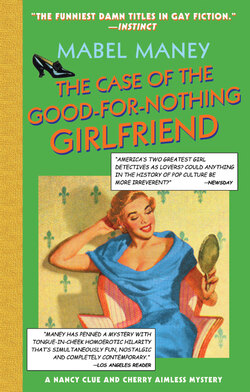Читать книгу The Case Of The Good-For-Nothing Girlfriend - Mabel Maney - Страница 4
About the Author
ОглавлениеMABEL MANEY was born at All Saint’s Hospital in Appleton, Wisconsin, to Marge Muldoon Maney, a former beauty queen whose titles include Miss Muskie Queen 1949 and Miss Cheese Log 1951, and Milton Maney, a traveling footwear salesman specializing in sensible shoes.
After her parents were lost at sea, Mabel’s spinster aunt, Miss Maude Maney, a successful women’s undergarments buyer for a local department store, enrolled Mabel at St. Agatha’s School for Girls in nearby Bear Lake, where she excelled in Conversational Skills and Table Manners. After an idyllic four years spent in the highest academic pursuits, Mabel was expelled for behavior too unpleasant to mention here.
Mabel enjoyed a short stint at the Appleton Home for Wayward Girls, after which she made her way west where she found employment in the film industry, training miniature collies to jump through hoops. Following many years devoted to canine education, Mabel retired to San Francisco, where she now resides.
Her key to success? “Never mix plaids with stripes!”
Mabel Maney is the author of The Case of the Not-So-Nice Nurse, The Case of the Good-For-Nothing Girlfriend, and Nancy Clue and the Hardly Boys in A Ghost in the Closet (Cleis Press). Her short stories have appeared in Best American Mystery Stories (Houghton Mifflin) and San Francisco Thrillers (Chronicle Books). Her new girl spy adventure series is forthcoming from Avon.
Maney’s installation art and handmade books, self-published under the World O’Girls Books imprint, have earned her fellowships from the San Francisco Foundation and San Francisco State University, where she received her MFA in 1991. Her art has been exhibited in galleries throughout the United States. Artspace wrote of her handmade World O’Girls edition of The Case of the Not-So-Nice Nurse: “In Maney’s refigured narrative, gay heroine Cherry Ames moves unhampered through a world populated by lesbian nuns and adventuresses, even engaging in a one-nighter with Nancy Drew. Entertainment aside, by appropriating and redefining the sexual orientation and cultural limits placed upon her fictional female characters, Maney provides a powerful reminder of the exclusionary nature of the ruling (in this case, straight) culture, with its power to define specific roles and acts as ‘natural’ while denying or marginalizing others.”
